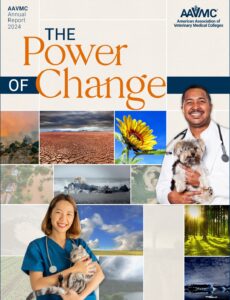A Legacy of Leadership
Leadership Development
Leadership has never played a more important role in the future of veterinary medicine and the academic institutions that support it. The AAVMC is preparing faculty members to play leadership roles in their colleges and universities and the veterinary profession through the Leadership Academy, the Public Policy Faculty Fellows program and other initiatives.
Leadership Academy
For information on enrollment and detailed program information, visit the Leadership Academy page.
AAVMC launched the Leadership Academy in 2012 to provide leadership development for emerging leaders in academia and to provide a forum for building lasting ties between faculty members at veterinary schools and departments around the world. While there are many types of leadership development training available, the AAVMC Leadership Academy is unique in that it is focused on helping develop tomorrow’s leaders of academic veterinary medicine. The participants quickly bond with one another and will find that they have colleagues and friends they can communicate with as they progress through their careers.
Participants are assigned to learning groups in which they work throughout the program. Each session also includes a reading assignment relevant to leadership in academic veterinary medicine, and learning groups discuss the readings and share their findings with the class to promote engaging discourse at each session.
The academy convenes for three sessions each year on various topics, such as leading change, managing conflict, strategic thinking and communication, including media training. The Leadership Academy also provides participants with the opportunity to accompany veterinary medical college deans to Capitol Hill to discuss pressing issues in academia and the profession with legislators and Congressional staff.
AAVMC Public Policy Faculty Fellows Program
The Public Policy Faculty Fellows Program, newly instituted in 2014, is designed to bring member institutions’ faculty members to Washington D.C. to develop leadership skills in the advocacy arena, explore the importance of public policy decisions to the profession, and gain overall knowledge of the legislative and regulatory process at the federal level. Each candidate must agree to advise and mentor future fellows and special consideration is given to nominees who have exhibited leadership skills, especially in the areas of advocacy and government.







SHARE